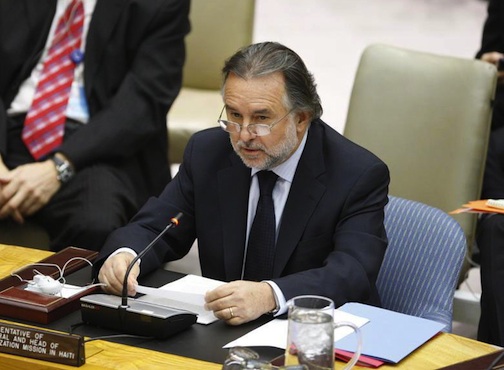Above: UN Special Representative in Haiti Mariano Fernandez Amuntageui (UN Photo)
By the Caribbean Journal staff
Haiti must continue working to strengthen the rule of law in the country, particularly through the country’s national police and electoral council, United Nations Secretary-General Ban Ki-moon said Wednesday.
Ban’s report was delivered by Mariano Fernandez Amunategui, the Secretary-General’s Special Representative in Haiti.
“The political process in Haiti remains vulnerable to setbacks linked to political instability, lack of respect for the rule of law and unmet social grievances,” Ban said in the report. “In this context, I urge the new government to do its utmost to continue to strengthen the country’s rule of law institutions and to redouble its efforts to combat unemployment and poverty.”
The report recommends an extension of the UN’s MINUSTAH peacekeeping force’s mandate in Haiti.
Ban praised the government of Haiti President Michel Martelly for its efforts to curb smuggling and corruption, however, along with creating jobs, drawing foreign investment and “improving socioeconomic conditions for Haitians.”
But much work remains to be done, the Secretary-General said, particularly the continued extreme poverty in Haiti.
The UN Security Council has been pushing Haiti on rule of law and security reforms, and Ban said strengthening the country’s Haitian National Police is a “main priority for MINUSTAH.”
“We can classify the security situation as stable, but with the fragility appropriate to a society going through a stabilization process, with precarious socioeconomic indicators and with extreme poverty affecting important sectors of the country,” Fernandez said.
The MINUSTAH chief said he had outlined a plan, in cooperation with Haiti’s government, for the eventual drawdown of MINUSTAH’s military presence, one which would gradually give a stronger role to the PNH.
Fernandez also noted the significance of establishing a Permanent Electoral Council, which has been stalled in Haiti since May.
He said MINUSTAH was working with Haiti’s international partners to facilitate a dialogue to help set up a “legitimate” council that would lead to planned senate, mayoral and municipal elections in the country.
Fernandez also mentioned the continued cholera epidemic in Haiti, which he said still remained a “serious challenge.”
“The epidemic affects the entire island, and we are working on a plan to intensify prevention, advance the fight against the disease and carry out all necessary measures to mitigate its effects,” he said.
Several reports have alleged that the disease was brought to Haiti by UN peacekeepers from Nepal, although Fernandez did not address that claim in the briefing.
